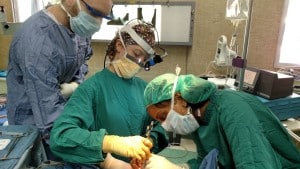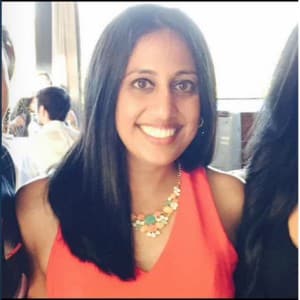

Sapna A. Patel MD, our University of Washington facial plastic surgery fellow for this year, just completed a mission trip to Balfate, Honduras on March 12-20, 2016 at the Hospital Loma de Luz in Balfate, Honduras. Here are some of her insights from that trip as well as some personal impressions about her mission. The model of combining education with surgery and commitment to follow-up is one we have embraced over the years.
Dr. Johnson grabbed my attention, “Hey, can you come see this patient with me? The other attending recommended a lip switch flap for reconstruction.” Imagining an elderly man with squamous cell carcinoma of the lip, my breath was taken away as there sat a petite, young blind girl whose face was consumed by a disease that I had only read about in textbooks, xeroderma pigmentosum.
The Honduran sun had transformed her beautiful face into one consumed by malignancy – a fate predestined despite all the medical and surgical care we could provide. “She wants to touch your hands,” said her caretaker. I slowly approached, as her hands reached out to my fingers, tears rolled down my face. During my ten years of medical training, I had never felt so moved by a patient. The intraoral bleeding from her dehisced excision site was treated with a simple bolster and figure of eight stitch, realizing that less is more for Deleny.
Deleny’s story was echoed in every patient we saw, and it outlined the reality of healthcare in Honduras. The town of Balfate is served by missionary doctors and families providing for the local population. Together, they put this city on the map and made the Hospital Loma de Luz a tertiary care center for patients in the region. More impressive than the organization and high standards for patient care was the selfless dedication displayed by the physicians and surgeons on the front lines. For most Hondurans, aside from the hospital in the capital city of Tegucigalpa, no real options exist.
During our week-long mission trip, we performed a variety of cases from maxillomandibular fixation, gold weight placement for eyelid paralysis, scar revision from a machete wound, cleft palate repair, total parotidectomy, complex thyroidectomies, and even a rhinophyma excision.
Each case we saw and the surgeries that we performed affirmed my confidence and knowledge in facial plastic and head and neck surgery. The challenges we faced humbled me each time; I had never done a parotidectomy without a facial nerve monitor. We may not have had the sharpest instruments or the best dissector, but each case was done without reservation to provide the best care possible. We planned accordingly and brought down our needed instruments, including arch bars, an eyelid gold weight, and a lacrimal set, providing sub-specialized care to a population that didn’t have access to it elsewhere. At the end of the week, we reviewed each patient’s case, and could rest assured knowing that our sister team from the Eastern Virginia Medical School would be able to provide follow-up in the fall, creating a continuity of care unlike most mission trips.
These missions, combining surgery with education and organized for excellent ongoing care, provide a good model for humanitarian assistance from the developed to less developed world.
On our last day in Balfate, we visited the Children’s Center, which like many organizations in the community is run by a missionary family. As we walked through, there she was sitting on her chair, so innocent and welcoming. She touched my hands and hair, and tears filled my eyes yet again. Deleny had not had any further bleeding. She led us to her shoes and motioned for us to come outside with her. We sat in the shaded area on the porch, as she crawled in our arms wanting to listen to music; her sense of touch, smell, and hearing remained, while the rest were consumed by the disease. We may not have cured her cancer, but at age six, her smiling face as she listened to music reminded me that sometimes the smallest things have the greatest impact. While we are proud of what we accomplished, we also recognize that our team members benefited so much from the experience and will be bringing those new insights back to our home practices.
